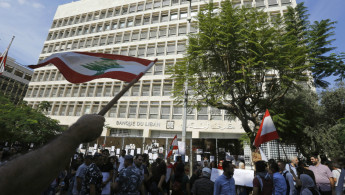Lebanon banks announce 'temporary' capital control measures amid security concerns
The Association of Banks announced the directives in a bid to "facilitate, standardise and regulate" the work of bank employees at a time of "exceptional circumstances", a statement said.
The measures include permitting hard currency transfers abroad only to cover "urgent personal expenses".
It said there would be no restrictions on "new money" brought in from abroad and urged customers to complete transactions with credit cards, preferably in Lebanese pounds.
Lebanon's bank staff union said it would extend to Monday a nationwide strike that began a week ago and that has kept banks shut.
Lebanese banks have been closed since last Tuesday because of the strike, which the bank employees' federation said was over security concerns by staff facing intimidation from clients demanding their money.
The union is set to meet Monday to discuss a security plan intended to keep branches safe and allow them to reopen.
Since the protests erupted on 17 October, banks have been closed for most of the time, only reopening this month but imposing strict controls on international transfers and caps on hard currency withdrawals.
However, each commercial bank had been setting its own policy.
On Friday, S&P Global Ratings downgraded Lebanon's sovereign debt, saying a twin political and economic crisis had hit investor confidence and constrained the government's funding model, which relies on deposit inflows.
Moody's rating agency downgraded Lebanon's sovereign debt earlier this month.
Even before the protests began, economic growth in Lebanon had plummeted in the wake of repeated political deadlocks in recent years, compounded by the war in neighbouring Syria.
Public debt stood at more than $86 billion, or higher than 150 percent of GDP, according to the finance ministry.
The World Bank says around a third of Lebanese live in poverty and has warned the struggling economy could further deteriorate if a new cabinet is not formed quickly - a tough challenge, in a country where administrations must maintain a delicate confessional balance.





 Follow the Middle East's top stories in English at The New Arab on Google News
Follow the Middle East's top stories in English at The New Arab on Google News
![The UAE is widely suspected of arming the RSF militia [Getty]](/sites/default/files/styles/image_330x185/public/2024-11/GettyImages-472529908.jpg?h=69f2b9d0&itok=Yauw3YTG)
![Netanyahu furiously denounced the ICC [Getty]](/sites/default/files/styles/image_330x185/public/2024-11/GettyImages-2169352575.jpg?h=199d8c1f&itok=-vRiruf5)
![Both Hamas and the Palestinian Authority welcomed the ICC arrest warrants [Getty]](/sites/default/files/styles/image_330x185/public/2024-11/GettyImages-2178351173.jpg?h=199d8c1f&itok=TV858iVg)